To hire top pilots for event photography, start by defining your specific needs, including event type and desired shots. Research qualified drone operators with valid FAA certifications and proper insurance. Evaluate their portfolios, focusing on experience with similar events and aerial photography quality. Assess their equipment to guarantee high-quality cameras and backup gear. Discuss your shot list, timeline, and safety protocols. Don't forget to review venue restrictions and arrange a pre-event walkthrough. By carefully considering these factors, you'll be well-equipped to choose a skilled pilot who can capture stunning aerial footage of your event. The following tips will help you make an informed decision.
Key Takeaways
- Verify FAA certifications, insurance coverage, and experience with specific event types.
- Review portfolios for diverse aerial shots, creative angles, and storytelling ability.
- Assess equipment quality, including high-resolution cameras and backup drones.
- Create a detailed shot list and coordinate with the pilot on event timeline and critical moments.
- Conduct a pre-event venue walkthrough to discuss restrictions, flight paths, and safety protocols.
Define Your Event Photography Needs
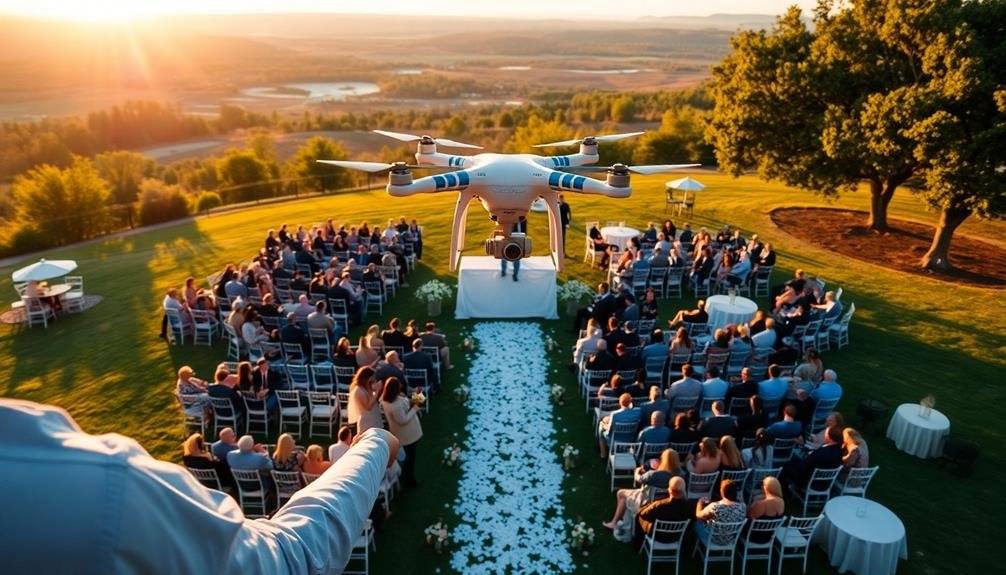
Frequently, the first step in hiring top pilots for event photography is to clearly define your needs.
Consider the type of event you're hosting, whether it's a wedding, corporate gathering, or outdoor festival. Each event requires different aerial photography skills and equipment. Determine the specific shots you want, such as wide-angle views of the entire venue or close-ups of key moments.
Think about the duration of your event and how long you'll need the pilot's services. Some events may require only a few hours of coverage, while others might span an entire day.
Consider the lighting conditions, as different times of day present unique challenges for aerial photography. You'll also need to decide on the final format of the images or videos, whether it's for social media, print, or large-scale projections.
Don't forget to check local regulations regarding drone usage in your area. Some locations may have restrictions on flying drones, which could impact your photography plans.
Research Qualified Drone Pilots
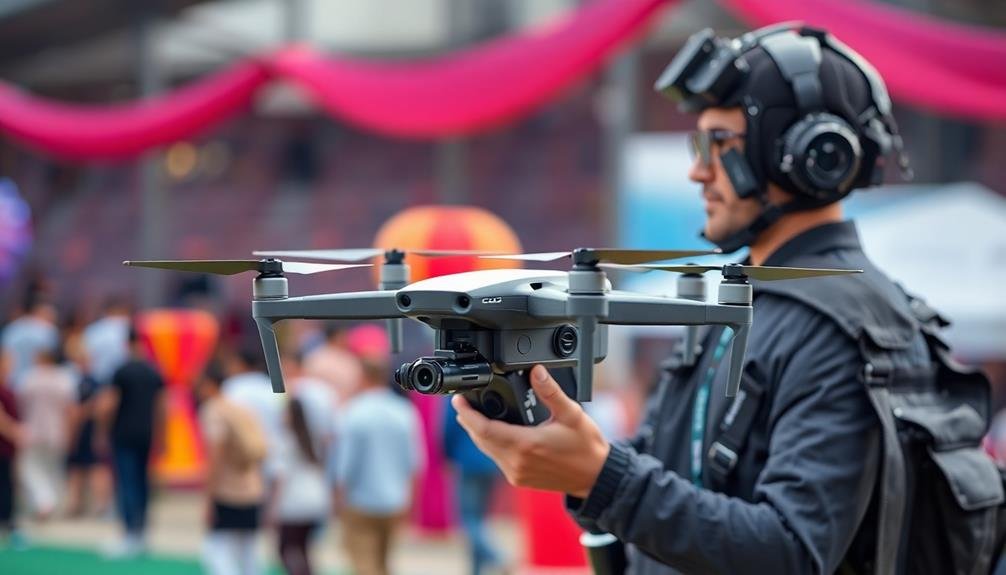
Diligence is key when researching qualified drone pilots for your event photography needs. Start by searching online platforms and directories specifically for licensed drone operators. Look for pilots with a strong portfolio of event photography work and positive client reviews.
Check their credentials carefully. Confirm they have a valid Remote Pilot Certificate from the FAA and current insurance coverage. Don't hesitate to ask for proof of these qualifications.
Consider the pilot's experience with your specific type of event. A wedding specialist may not be the best fit for a large outdoor festival. Ask about their equipment and backup plans in case of technical issues.
| Qualification | Importance |
|---|---|
| FAA License | Essential |
| Insurance | Required |
| Portfolio | Very High |
| Reviews | High |
| Experience | Important |
Once you've narrowed down your options, reach out to potential pilots for interviews. Discuss their approach to event photography, their familiarity with local regulations, and their ability to work within your event's specific constraints. Pay attention to their communication skills and professionalism, as these will be vital on the day of your event.
Verify Licenses and Insurance
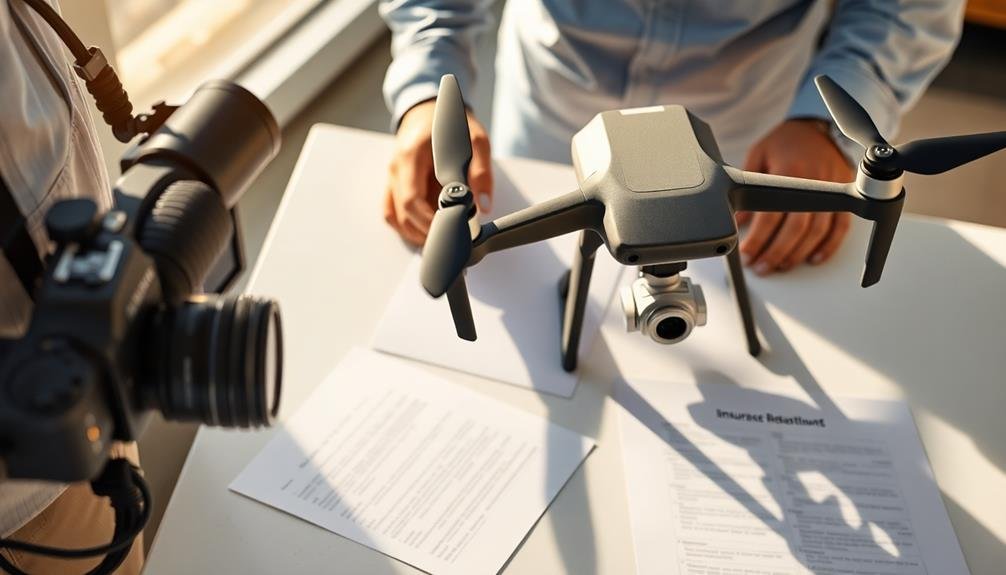
When hiring drone pilots for event photography, you'll need to verify their credentials and insurance.
First, check that they possess valid FAA Part 107 certifications, which are required for commercial drone operations.
Additionally, make certain they've adequate liability coverage to protect both you and your event from potential incidents or damages.
Check FAA Certifications
Before hiring a pilot for event photography, it's crucial to verify their FAA certifications. The Federal Aviation Administration (FAA) requires drone operators to hold specific certifications for commercial use. You'll need to confirm your potential hire has a valid Part 107 Remote Pilot Certificate, which demonstrates their knowledge of airspace regulations, weather patterns, and safe drone operation.
Ask to see their certificate and verify its authenticity through the FAA's website. Check the expiration date, as these certificates must be renewed every 24 months. Additionally, inquire about any waivers or authorizations they've obtained for special operations, such as flying at night or over people.
Here's a quick reference guide for FAA certifications and requirements:
| Certification | Purpose | Validity |
|---|---|---|
| Part 107 | Commercial drone operation | 24 months |
| Night waiver | Flying after dark | Case-specific |
| Over people waiver | Flying above crowds | Case-specific |
| Airspace authorization | Flying in controlled airspace | Location-specific |
| Aircraft registration | Identifying the drone | 3 years |
Don't hesitate to ask for proof of recent flight experience or additional training. A reputable pilot will gladly provide this information, demonstrating their commitment to safety and professionalism in event photography.
Confirm Liability Coverage
After verifying FAA certifications, you'll want to confirm the pilot's liability coverage. This step is vital for protecting yourself, your event, and your guests from potential financial risks associated with drone operations.
Ask the pilot to provide proof of insurance, specifically a policy that covers commercial drone use. Look for coverage that includes both bodily injury and property damage liability.
Don't hesitate to request a certificate of insurance naming you or your organization as an additional insured party. This extra layer of protection guarantees you're covered in case of an incident.
Check the policy limits to verify they're adequate for your event's size and location. Typical coverage ranges from $1 million to $5 million, but higher-risk events may require more.
Be wary of pilots who can't provide proper insurance documentation or those with insufficient coverage. Remember, general liability insurance often doesn't cover drone operations, so confirm that the policy specifically mentions unmanned aerial vehicles or drones.
If a pilot is reluctant to share insurance information, consider it a red flag and continue your search. Proper liability coverage protects everyone involved and demonstrates the pilot's professionalism and commitment to safety.
Evaluate Portfolio and Experience
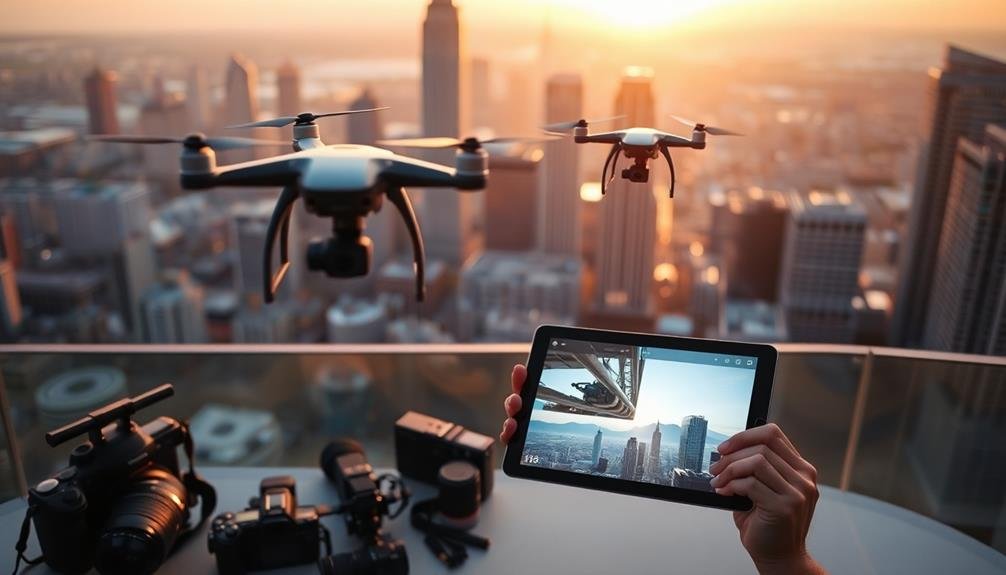
Evaluating a drone pilot's portfolio and experience is essential when hiring for event photography. You'll want to review their previous work to verify it aligns with your event's style and requirements.
Look for diversity in their portfolio, including both indoor and outdoor shots, as well as various types of events like weddings, concerts, and corporate gatherings.
Pay attention to the quality of their aerial footage and photographs. Check for smooth movements, stable shots, and creative angles that showcase the event's atmosphere.
Assess their ability to capture key moments and tell a compelling visual story.
Consider the pilot's experience level and how long they've been operating drones professionally. Ask about their familiarity with different drone models and their proficiency in post-production editing.
Inquire about any specialized training or certifications they've obtained beyond the basic FAA requirements.
Don't hesitate to request references from past clients. Contact these references to gain insights into the pilot's reliability, professionalism, and ability to work under pressure.
Additionally, ask about their experience dealing with unexpected challenges during events, such as sudden weather changes or technical issues.
Assess Equipment and Technology
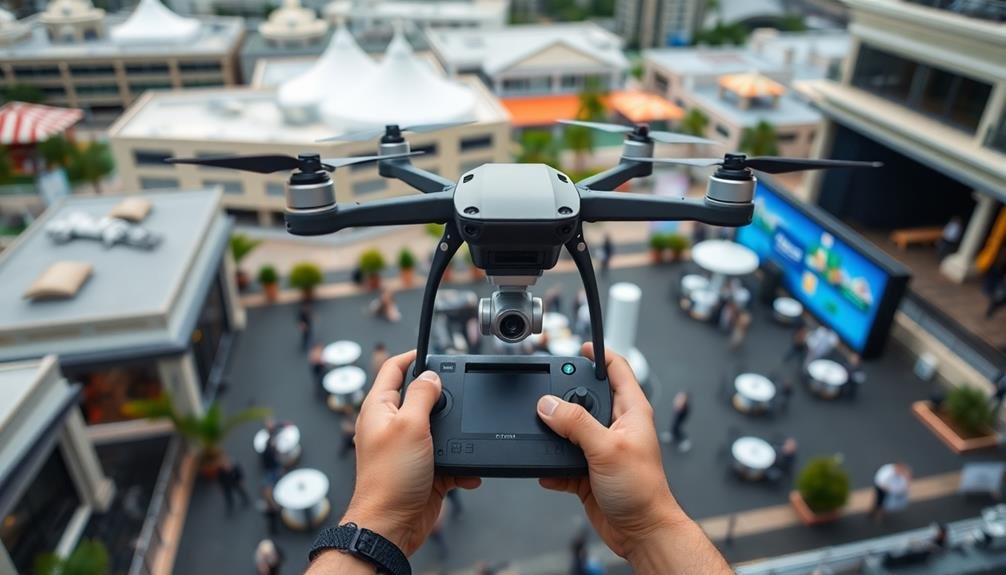
Once you've evaluated a pilot's portfolio and experience, it's time to examine their equipment and technology. Ask about the drones they use, making sure they're suitable for event photography. Look for models with high-quality cameras, capable of capturing at least 4K video and 20MP stills. Inquire about their backup equipment in case of malfunctions.
Check if they use obstacle avoidance systems and return-to-home features for safer flights. Ask about their camera stabilization technology, such as 3-axis gimbals, which are essential for smooth footage. Discuss their proficiency with various shooting modes, including manual settings for challenging lighting conditions.
Inquire about their post-processing capabilities. Do they have software for editing and color grading? Can they deliver both raw and processed files? Ask about their data management and backup practices to guarantee your photos and videos are safe.
Don't forget to verify that their equipment complies with local regulations. Some events may have specific requirements or restrictions on drone use.
Check Availability and Pricing
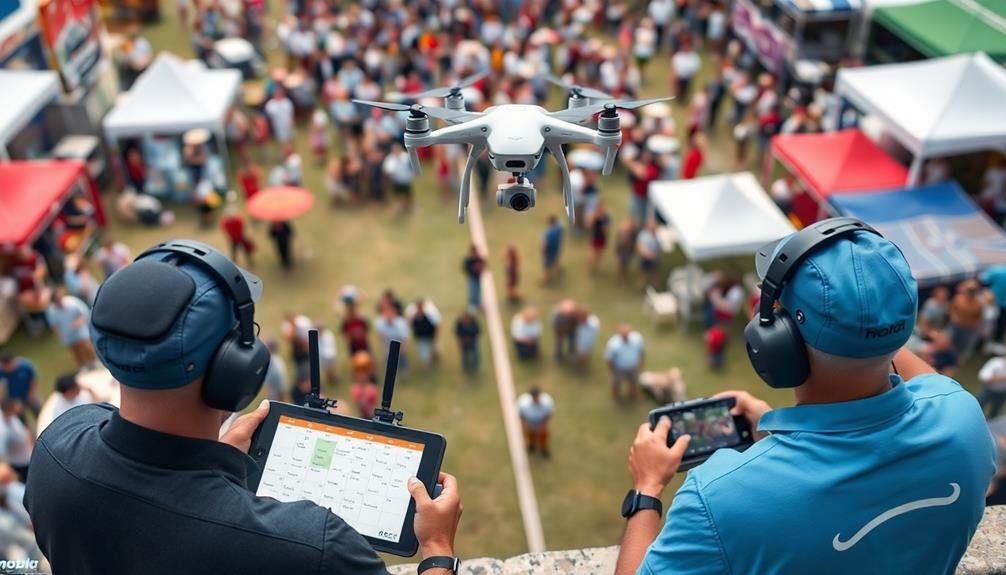
The next vital step in hiring top pilots for event photography is to check their availability and pricing. Once you've identified potential candidates, reach out to them promptly to inquire about their schedules. Event dates are often fixed, so it's essential to ascertain the pilot can commit to your specific timeframe.
When discussing pricing, ask for a detailed breakdown of their fees. This should include the pilot's time, equipment usage, post-processing work, and any travel expenses.
Don't forget to inquire about their policy for overtime or unexpected delays. Some pilots may offer package deals for longer events or multiple bookings, so explore these options if applicable.
Be prepared to provide specifics about your event, such as location, duration, and any special requirements. This information will help the pilot give you an accurate quote.
Compare rates between different pilots, but remember that the cheapest option isn't always the best. Consider the pilot's experience, portfolio quality, and equipment when evaluating their pricing.
If a pilot's rate seems unusually low or high, ask for clarification to understand what's included or why there's a premium.
Discuss Shot List and Timeline
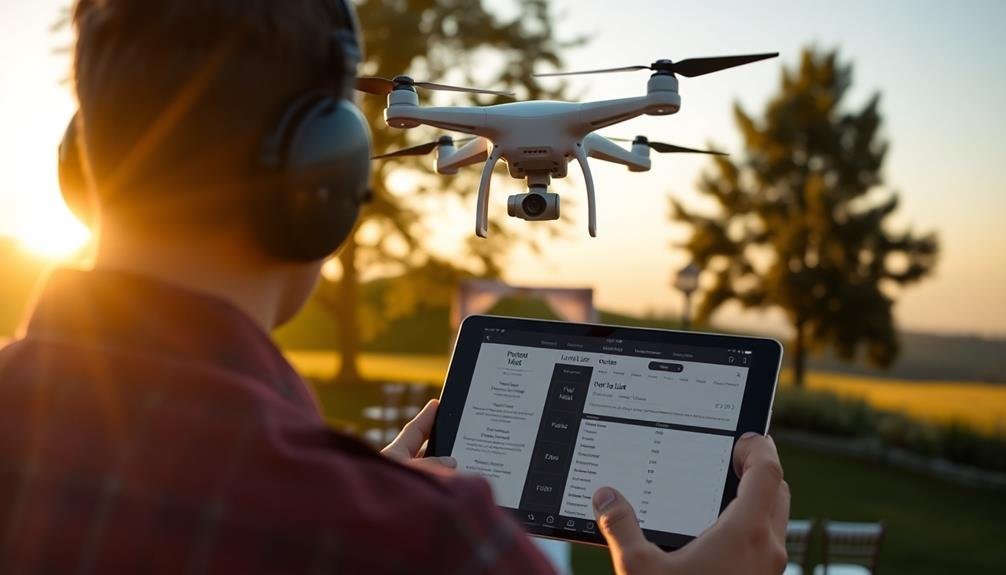
After settling on a pilot and their pricing, it's time to map out your event's aerial coverage. Start by creating a detailed shot list that outlines the specific aerial footage you want captured. Include key moments, locations, and any special requests you have for the drone pilot. Be certain to prioritize these shots based on their significance to your event's overall narrative.
Next, work with the pilot to develop a timeline for the day. Consider factors like lighting conditions, event schedule, and battery life limitations. You'll want to guarantee the drone is in the air during essential moments while also allowing time for battery changes and equipment adjustments.
Discuss any potential obstacles or restricted areas that might affect flight plans. Don't forget to communicate any specific style preferences you have for the footage, such as particular angles, heights, or movements.
If you're planning to use the aerial shots alongside ground-based photography, coordinate with your other photographers to guarantee a cohesive visual story. Finally, be open to the pilot's suggestions – their experience can often lead to creative shots you hadn't considered.
Review Safety Protocols
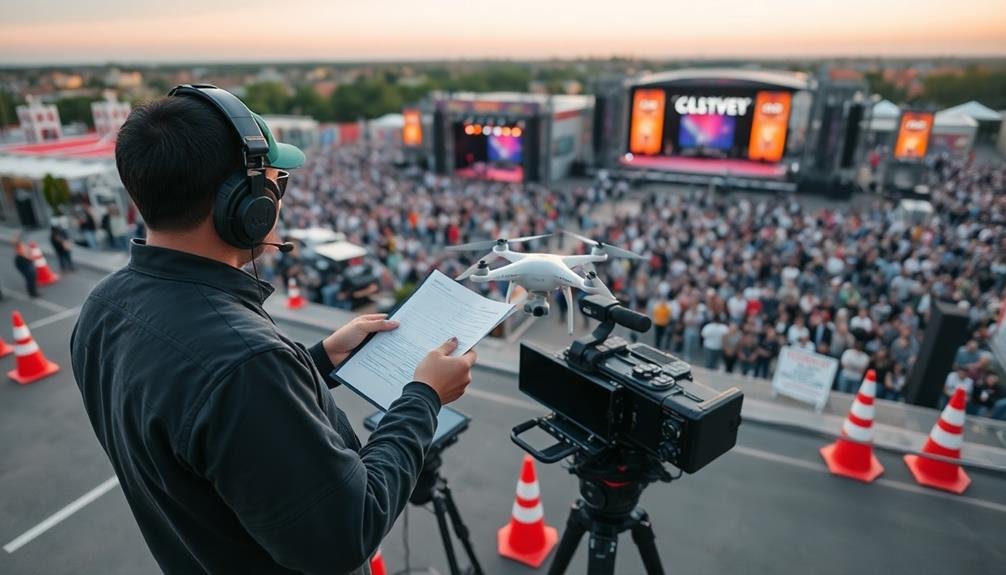
Before your event, guarantee your hired pilot conducts thorough pre-flight safety checks on the drone equipment.
You'll want to discuss emergency landing procedures with the pilot, identifying safe zones and potential hazards.
Don't forget to assess weather conditions together, as wind, rain, or extreme temperatures can impact flight safety and image quality.
Pre-Flight Safety Checks
Prior to takeoff, reviewing safety protocols is vital for every drone pilot. You'll want to guarantee that your hired professionals conduct thorough pre-flight safety checks to minimize risks and maintain compliance with regulations. These checks should cover both the drone equipment and the surrounding environment.
Instruct your pilots to perform the following pre-flight safety checks:
- Inspect the drone's physical condition, including propellers, motors, and frame
- Check battery levels and verify they're fully charged
- Calibrate compass and GPS systems
- Review local airspace restrictions and obtain necessary permissions
- Assess weather conditions and wind speeds
Encourage pilots to use a checklist to systematically go through these steps before each flight. They should also familiarize themselves with the specific event location, identifying potential hazards like power lines, trees, or buildings.
It's essential that pilots understand and adhere to FAA regulations, including maintaining visual line of sight and respecting altitude limits.
You'll want to verify that your hired pilots have emergency procedures in place, such as how to handle equipment malfunctions or unexpected obstacles.
Emergency Landing Procedures
Even the most skilled pilots can encounter unexpected issues during a flight. When hiring pilots for event photography, it's vital to guarantee they're well-versed in emergency landing procedures.
You'll want to confirm that your pilots have a thorough understanding of how to handle various scenarios, from equipment malfunctions to sudden weather changes.
Ask potential hires about their experience with emergency landings and how they've handled unexpected situations in the past. Verify that they're familiar with the specific drone models you'll be using and can quickly identify and respond to any warning signals or system failures.
It's important that your pilots know how to safely bring the drone down in different environments, including crowded areas or near obstacles.
Make sure your pilots are up-to-date on local regulations regarding emergency landings and have a clear protocol for communicating with event organizers and attendees in case of an incident.
Regular training and simulations can help keep these skills sharp. By prioritizing pilots who take emergency procedures seriously, you'll minimize risks and guarantee the safety of both your equipment and event attendees.
Weather Condition Assessment
Skilled pilots consistently assess weather conditions before and during their flights. When hiring pilots for event photography, make certain they're well-versed in weather assessment techniques. They should be able to interpret meteorological data, understand its impact on flight safety, and make informed decisions.
You'll want pilots who can:
- Read and analyze weather reports and forecasts
- Identify potential hazards like thunderstorms, wind shear, or icing conditions
- Assess visibility and cloud coverage for ideal photography conditions
- Understand how weather affects drone performance and battery life
- Make quick, safe decisions if conditions change mid-flight
Look for pilots who prioritize safety and aren't afraid to postpone or cancel flights when necessary. They should be able to explain weather-related decisions clearly to clients and team members.
During the hiring process, ask candidates about their weather assessment procedures and how they've handled challenging conditions in the past.
Communicate Venue Restrictions
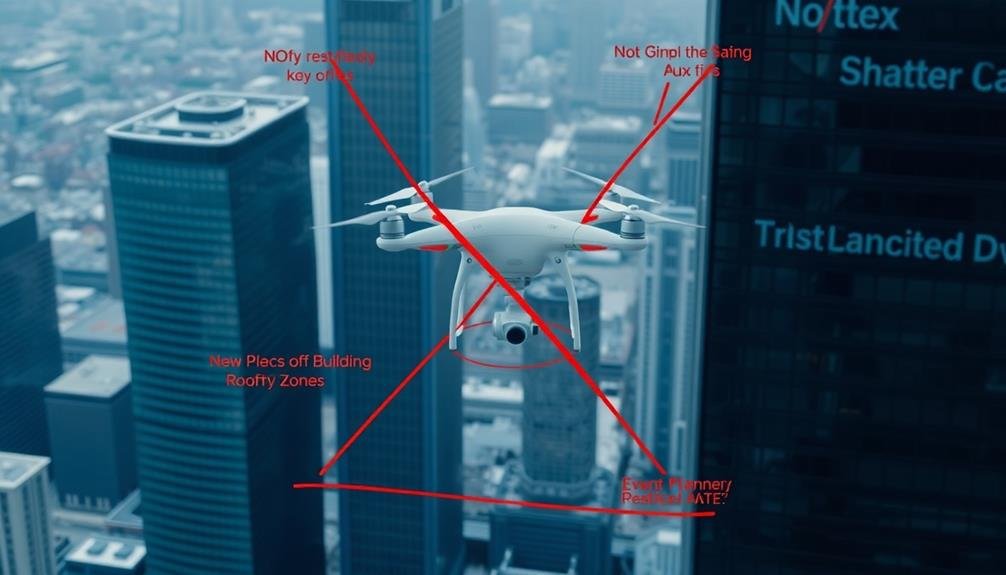
When hiring drone pilots for event photography, it is crucial to communicate any venue restrictions clearly and promptly. Inform pilots about specific rules, no-fly zones, and any required permits or permissions. This guarantees they can plan accordingly and avoid potential legal issues or safety concerns.
Provide a detailed briefing on the venue's layout, including restricted areas, power lines, and other potential hazards. Discuss height limitations, if any, and specify areas where drone flights are permitted. Be sure to mention any time constraints or noise restrictions that may affect drone operations.
Consider creating a thorough guide for pilots, including:
| Restriction Type | Details | Impact on Operations |
|---|---|---|
| No-fly zones | Near buildings, crowds | Limited shot options |
| Height limits | Max 400 feet AGL | Affects wide-angle shots |
| Time constraints | Only during breaks | Requires precise timing |
Arrange Pre-Event Walkthrough
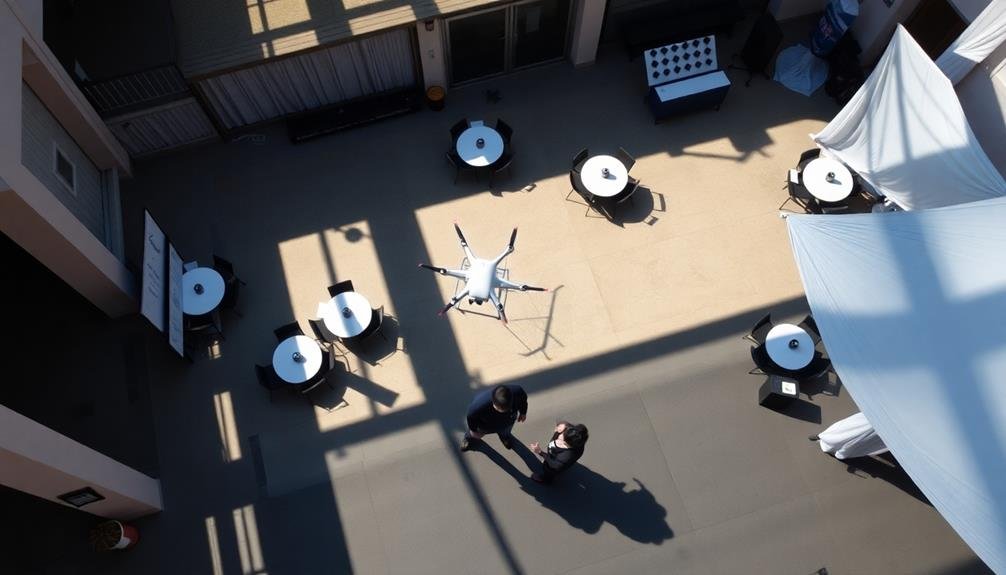
A pre-event walkthrough is essential for guaranteeing smooth drone operations during your event. Schedule this walkthrough with your hired pilot at least a few days before the event. During this visit, you'll have the opportunity to discuss specific shot requirements, identify potential obstacles, and establish flight paths.
Walk through the entire venue with your pilot, pointing out key areas you want captured. This is your chance to communicate your vision and guarantee the pilot understands your expectations. Together, you can:
- Scout for ideal takeoff and landing zones
- Identify any no-fly zones or restricted areas
- Assess potential interference from Wi-Fi signals or other electronic devices
- Determine the best angles for capturing important moments
- Plan for any lighting challenges or weather considerations
Use this time to review the event schedule and highlight critical moments that require drone coverage. Discuss any specific shots or techniques you'd like to see, such as revealing sweeps or dynamic follow shots.
Frequently Asked Questions
Can Drone Pilots Capture Both Photos and Videos During an Event?
Yes, you can expect drone pilots to capture both photos and videos during an event. They'll typically use high-quality cameras mounted on their drones, allowing them to switch between still photography and video recording seamlessly throughout the occasion.
How Far in Advance Should I Book a Drone Pilot?
You'll want to book a drone pilot at least 4-6 weeks in advance. This gives them time to plan, scout locations, and secure necessary permits. For popular dates or complex shoots, consider booking even earlier to guarantee availability.
What Happens if Weather Conditions Are Unfavorable on the Event Day?
If weather's unfavorable on your event day, you'll need to discuss options with your drone pilot. They might suggest rescheduling, using alternative equipment, or adjusting flight plans. Always have a backup plan for outdoor shoots.
Are There Additional Editing Services Offered by Drone Photographers?
You'll find many drone photographers offer additional editing services. They'll enhance your footage, create highlight reels, or even add special effects. Don't hesitate to ask about these options when you're discussing your event photography needs.
Can Drone Pilots Work Indoors for Certain Parts of the Event?
Yes, you can hire drone pilots for indoor shots at your event. They'll use smaller drones with protective guards. However, you'll need to guarantee proper lighting, space, and safety measures. Always check venue policies before booking indoor drone photography.
In Summary
You're now equipped to hire top pilots for your event photography. Remember to prioritize safety, experience, and communication throughout the process. Don't hesitate to ask questions and verify credentials. By following these steps, you'll secure a skilled drone pilot who can capture stunning aerial footage of your event. With the right professional behind the controls, you'll elevate your event photography to new heights and create unforgettable memories.
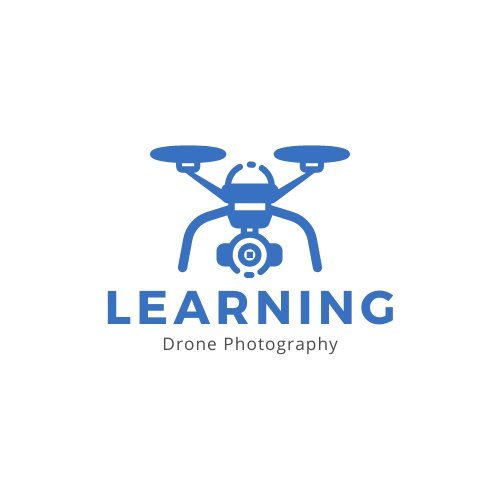
As educators and advocates for responsible drone use, we’re committed to sharing our knowledge and expertise with aspiring aerial photographers.
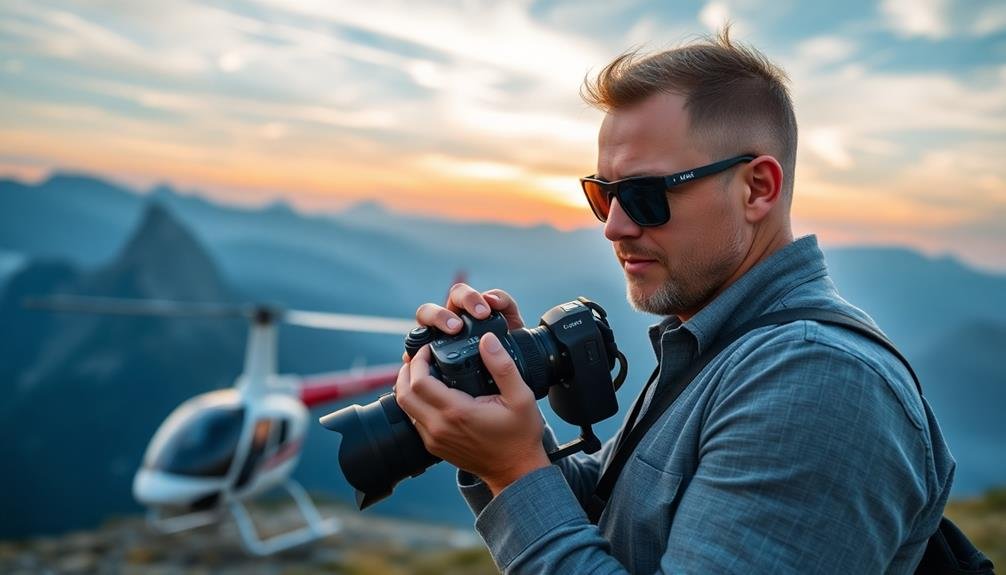
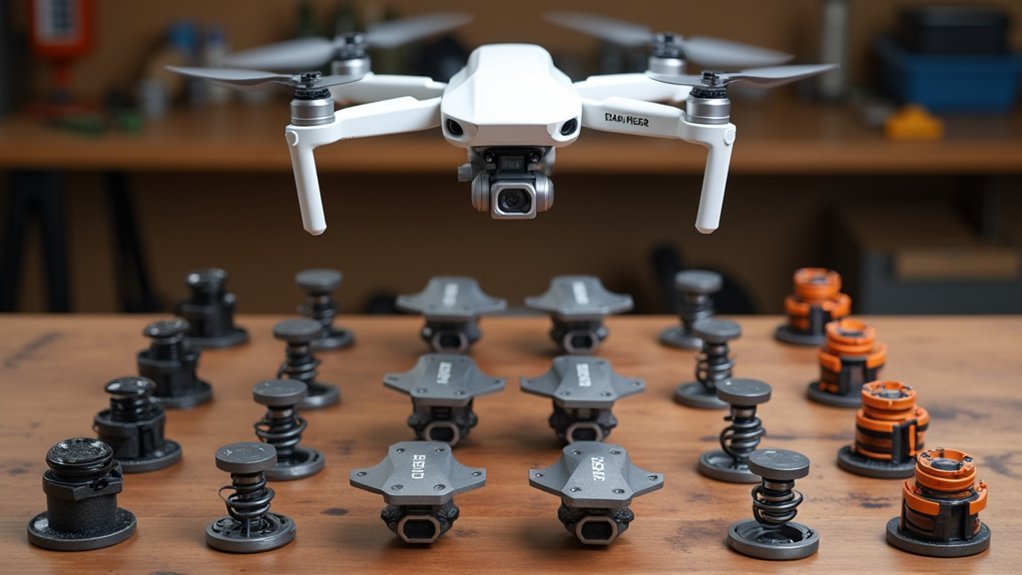
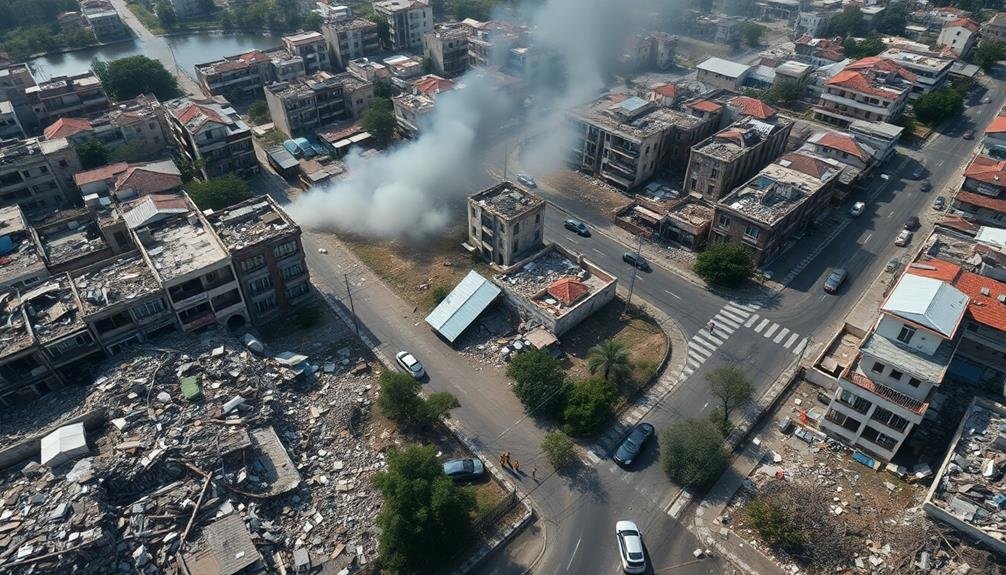
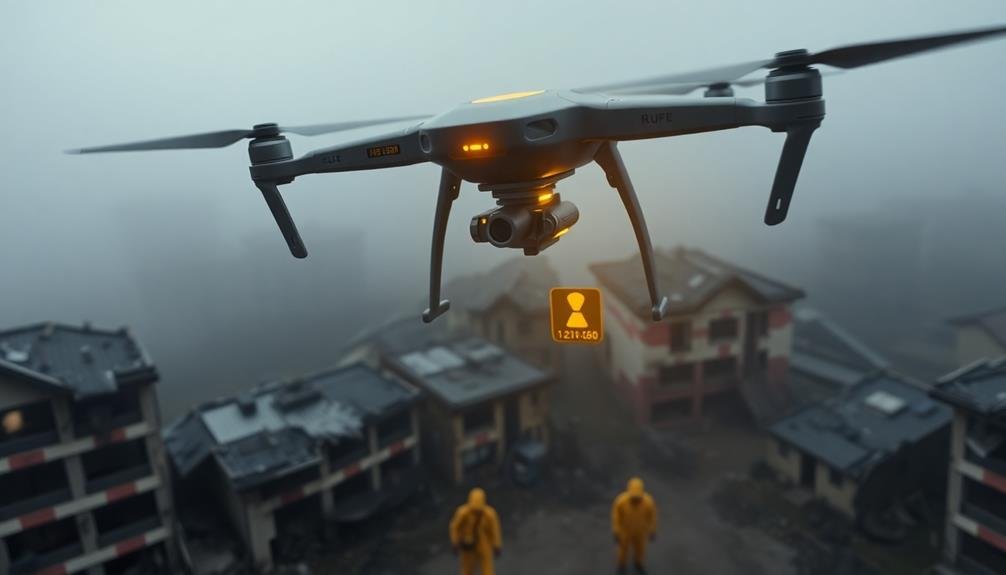
Leave a Reply